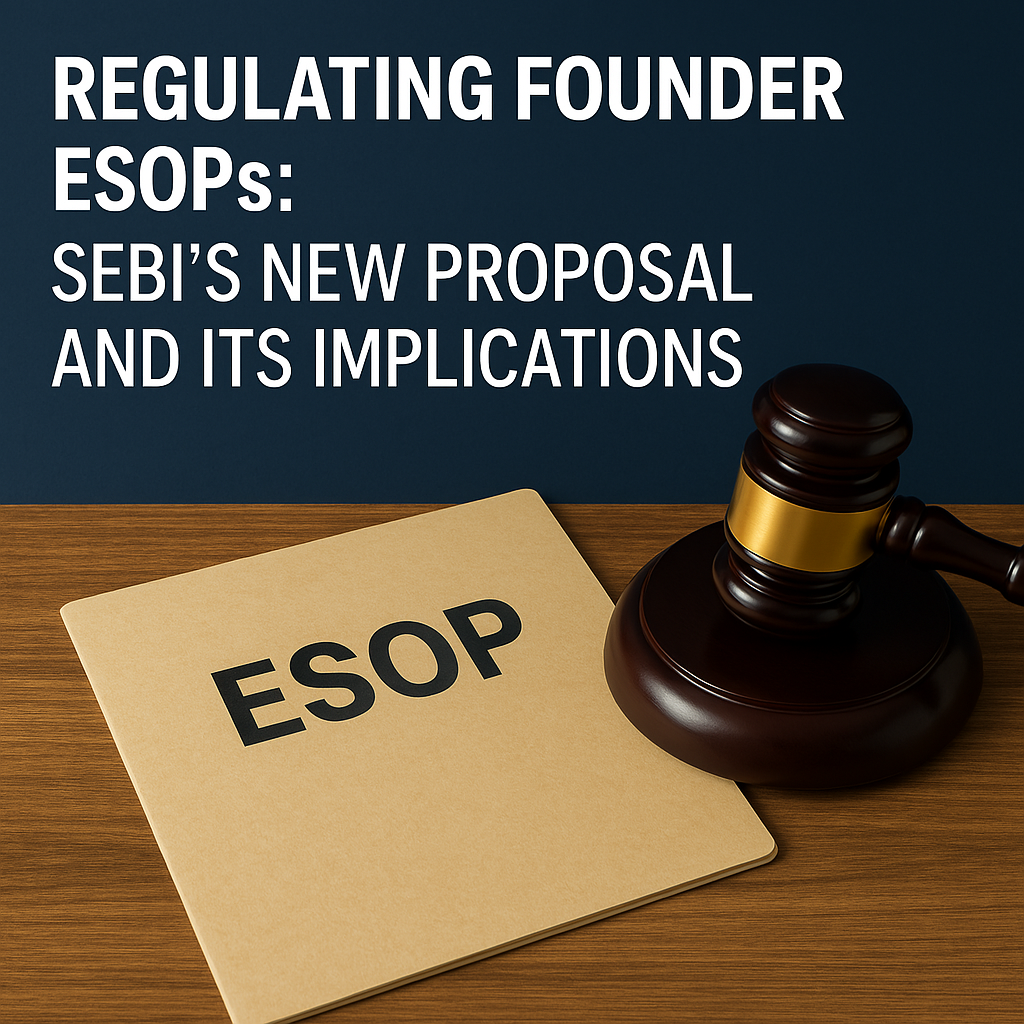|
Powered by AltAlpha AI
|
Anany Tiwari is a fourth-year law student at Hidayatullah National Law University
Introduction
Recently, the Securities and Exchange Board of India (SEBI) has proposed an amendment, through a consultation paper dated March 20, 2025, to the SEBI (Share Based Employee Benefits and Sweat Equity) Regulations, 2021(SEBI SBEB & SE Regulations). The primary objective is to fill the existing gap regarding streamlining the treatment of Employee Stock Options (ESOPs) granted to the founders of New-Age Technology Companies (NATCs), who are classified as promoters when the company pursues an Initial Public Offering (IPO). Once a founder is classified as a promoter, he no longer remains an employee under the existing laws and hence the question arises, what would happen to the ESOPs that were granted to them? This amendment proposes to validate ESOPs post-filing of a Draft Red Herring Prospectus (DRHP) for an IPO. This indicates an initiative by SEBI to provide an atmosphere for the promotion and advancement of the NATCs.
This article first examines the present framework regarding grant of ESOPs to the founders and the challenges faced by them when they are tagged as promoters at the stage of IPO. Secondly, key aspects of the proposed amendment are looked into and how it addresses the challenge that founder face at the stage of IPO. Lastly, it analyses the shortcomings in the proposed amendment and its impact.
Background and Existing Legal Landscape
Under the current framework, companies cannot grant ESOPs to promoters. This Limitation arises from Rule 12 of the Companies (Issue of share capital and Debenture) Rules, 2014 read with Regulation 2(1)(i) of SEBI SBEB & SE. However, an exception exists for startups registered with the Department for Promotion of Industry and Internal Trade (DPIIT). This stems from the recommendations made in the Companies Law Committee Report, 2016, which recognized that the promoters in startup often function as employee or whole-time director. The idea behind this exemption is that granting ESOPs allows Startups to compensate the founders acting as employees without hampering the cash flows.
ESOPs are offered to the founders instead of compensating them in cash during the founding years of the company, this is done to avoid dilution in the founders’ shares with each successive round of investment. Each subsequent issue leads to a decrease in the value of shares that the founders hold with the new investment coming in, and the total number of shares increases. The Companies Act 2013, under section 62(1)(b) and Rule 12 of the Companies (Issue of Share Capital and Debenture) Rules, 2014, do not consider the promoters to be employees. Further, under the regulatory framework i.e. Issue of Capital and Disclosure Requirements (ICDR) regulations, the promoter has been defined as a person who exercises control over the affairs of the issuer whether directly or indirectly, hence it can be safely deciphered that the founder is classified as a promoter at the time when the company files its DHRP. Therefore, through the combined reading of the regulatory framework and the laws, it is clear that the founders are considered to be promoters under the ICDR regulations and the same promoters are not considered to be employees under the Companies (Issue of share capital and Debenture) Rules and the Companies Act. Then the question arises whether the ESOPs issued to the founder before the company files for an IPO would be sustained or not?
When companies go for IPOs by filing their DHRP, their founders are classified as promoters as per the ICDR regulations. Once classified as promoters, they no longer qualify as employees under the SEBI SBEB & SE Regulations, meaning they cannot receive or exercise ESOPs. However, existing regulations do not address whether ESOPs granted before the IPO can still be exercised after founders become promoters post the filing of DHRP. This ambiguity creates uncertainty for founders who have relied on ESOPs as long-term incentives.
Proposed Amendment
To address the challenge of the founders at the stage of filing for DHRP, SEBI has proposed an amendment to allow the employees who are later recognized as promoters to retain the ESOPs that they had before filing for DHRP. The key condition is that the ESOPs must have been granted a year before the Board decided to move for an IPO. This rules out the ambiguity that the founders had concerning the ESOPs that were issued to them pre-IPO. This amendment specifies that if ESOPs are granted to the founders a year before the company decides to go for an IPO, they can continue to hold the same in the capacity of a promoter after the company decides to go for an IPO. Now, the founders can remain definite about the ESOPs that they usually accept as long-term incentives. This would lead to a steady cash flow for the company because they can compensate the founders with ESOPs. After all, compensating them on salaries would have taken away a significant amount of money that could’ve been used to expand the company in their initial years.
Analysis
It is essential to mention that when an individual ceases to be an employee, Regulation 9(6) of the SEBI SBEB & SE Regulations 2021 comes into the picture. The proviso to this regulation clearly states that such employees are entitled to the vested ESOPs. Further, in case of retirement or superannuation, ESOPs that were granted but not vested will continue to vest. Along these lines, SEBI proposed this amendment, where an employee is classified as a promoter and has proposed that such a classification should not let them forego their benefit, which formed part of their remuneration. Therefore, a second explanation is proposed to be added to Regulation 9(6), clarifying that the employees who were granted ESOPs before being identified as promoters would be eligible for holding such ESOPs.
The amendment seeks to strike a crucial balance between preventing regulatory arbitrage and recognizing genuine employee contributions. The one-year holding requirement ensures that ESOPs are not misused as a last-minute incentive just before a public offering while still protecting long-term contributions.
While the proposed amendment provides much-needed clarity, it does not fully resolve the regulatory challenges surrounding founder ESOPs. First, while the existing ESOPs are carried forward despite becoming promoters, no provisions have been proposed to be added to issue new ESOPs post IPOs. This may lead to deterrence in companies offering long-term incentives to the promoters and can also lead to the dilution of their shares with each successive issue. Therefore, reconsidering allowing fresh grants would enhance the founder’s protection. Secondly, there’s ambiguity in defining the one-year look-back period as the proposal does not clarify whether the one year is calculated from the board’s initial decision of going public or formal approval or the actual DHRP filing. Given that the timelines for an IPO can be unpredictable, defining this period from the DHRP filing date may provide greater clarity. Lastly, by allowing ESOPs to be granted post-issue and clarifying the date of a one-year look back, the amendment could encourage more NATCs to go public. However, the inability to issue fresh ESOPs post-IPO may discourage some founders from seeking promoter designation, potentially leading to structuring loopholes.
Additionally, this consultation paper has come amid reports that SEBI is considering implementing stricter disclosure norms for the IPO-bound NATCs. One of the major proposed changes is to extend the disclosure timeline for past transactions and fundraising from 18 months to 3 years. This implies that all the transactions for the past three years have to be disclosed. This would ensure that no last-minute ESOP grant or equity restructuring could benefit founders or insiders before the IPO. SEBI is both easing certain ESOP restrictions (to encourage listing) and tightening financial disclosure rules (to improve transparency).
Conclusion
The proposed amendment is a welcome step, addressing the challenge that founders faced post-IPO in regards to their ESOPs. By allowing one-year look-back period, SEBI acknowledges the significant contribution of founders at the forming stages of the company and at the same time ensures that last-minute allotment doesn’t create any regulatory arbitrage. However, the amendment does not propose a provision for the issue of ESOPs to promoters post-IPO, which could deter long-term incentives for founders.





